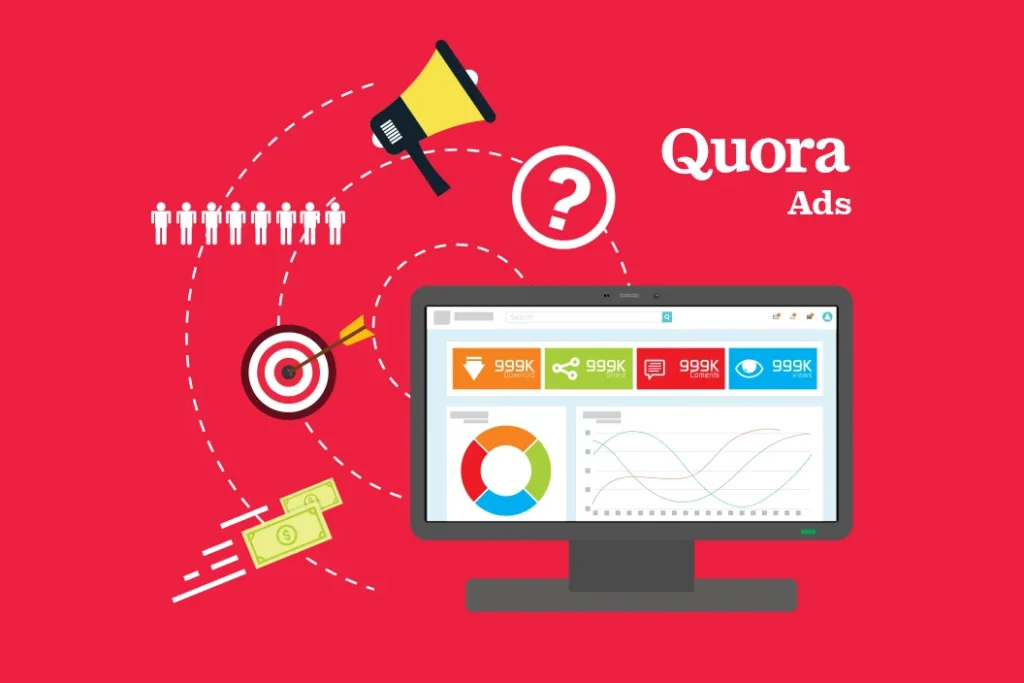


Quora ads can be a unique and effective way to reach users who are actively seeking answers and solutions to their questions. As a platform known for its Q&A format, Quora allows advertisers to target users based on the topics they’re interested in and the questions they’re asking. Here’s a detailed guide to help you navigate Quora ads:
1. Getting Started with Quora Ads
A. Set Up a Quora Ads Manager Account
- Business Account: Create or convert your Quora account to a business account if you haven’t already.
- Ads Manager: Access Quora Ads Manager to create and manage your ad campaigns.
2. Define Your Campaign Objectives
Quora offers several advertising objectives:
- Traffic: Drive users to your website or landing page.
- Conversions: Encourage specific actions on your website, such as sign-ups or purchases.
- App Installs: Promote your app to drive installations.
- Lead Generation: Collect leads through forms or landing pages.
3. Audience Targeting
Quora allows for precise targeting based on user behavior and interests:
- Topics: Target users interested in specific topics or questions related to your business.
- Keywords: Use keywords to target users who have engaged with content related to those keywords.
- Question Targeting: Target ads based on specific questions users have asked or engaged with.
- Behavioral Targeting: Reach users based on their browsing behavior and past interactions on Quora.
- Demographics: Narrow down by location, gender, and age.
- Custom Audiences: Upload your own customer lists to retarget or create lookalike audiences.
4. Ad Formats
Quora offers various ad formats to suit different marketing goals:
- Text Ads: Simple and effective, ideal for direct and concise messaging.
- Image Ads: Visual ads that can include images to capture attention.
- Promoted Answers: Highlight your content or answers to questions relevant to your audience.
- Video Ads: Engage users with dynamic video content.
5. Creating Your Ad
- Ad Copy: Write clear, compelling text that addresses user interests and pain points.
- Visuals: Use high-quality images or videos that align with your brand and message.
- Call-to-Action (CTA): Include a strong CTA to guide users toward the desired action (e.g., “Learn More,” “Sign Up,” “Buy Now”).
6. Budgeting and Bidding
- Budget: Set a daily or total campaign budget.
- Bidding Options: Choose between Cost Per Click (CPC), Cost Per Thousand Impressions (CPM), or Cost Per Action (CPA), depending on your campaign objectives.
- Bid Strategy: Optimize bids based on your campaign goals to control costs and maximize ROI.
7. Analytics and Optimization
- Performance Metrics: Monitor key metrics like impressions, clicks, click-through rate (CTR), conversions, and cost-per-click (CPC).
- A/B Testing: Test different ad creatives, headlines, and targeting options to find what performs best.
- Adjustments: Use insights from performance data to refine and optimize your campaigns.
8. Compliance and Best Practices
- Ad Policies: Adhere to Quora’s advertising policies to ensure your ads meet platform guidelines.
- Relevance: Ensure your ads are relevant to the questions and topics your target audience is engaging with.
- Engagement: Create engaging and informative content that adds value to users’ experiences on Quora.
9. Advanced Strategies
- Topic and Keyword Research: Conduct thorough research to identify relevant topics and keywords that align with user interests.
- Retargeting: Re-engage users who have interacted with your brand or visited your site.
- Content Marketing: Use Quora as a platform to promote high-quality content and establish thought leadership.
10. Learning and Support
- Quora Ads Help Center: Access Quora’s resources and documentation for advertisers.
- Quora for Business: Explore best practices and case studies to enhance your ad campaigns.
